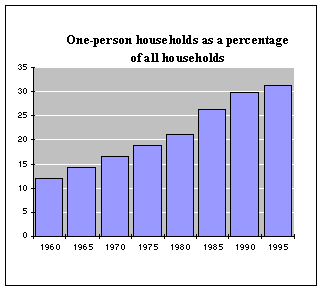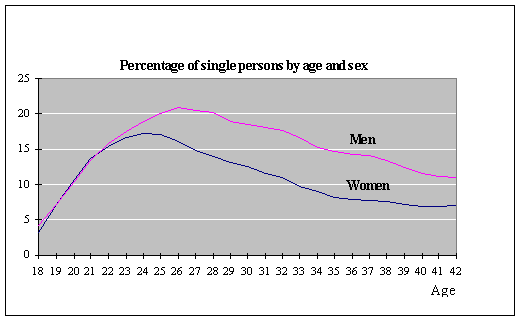ONE THIRD OF
THE DUTCH LIVE ALONE
13 March 1998
With an average age of 28, Dutch women
are amongst the oldest first-time mothers in the world. One in
five Dutch women born in the 1970s will remain childless,
compared with one in ten of those born in 1945.
These are some of the findings published
by the United Nations Economic Commission for Europe (UN/ECE) in Fertility
and Family Surveys in Countries of the ECE Region, Standard
Country Report, The Netherlands.
The report also shows that since 1975
mean female age at first marriage has risen from 22.6 in 1975 to
27.4 years in 1995. The marriage experience is partly compensated
by cohabitating experience, though not completely. For example,
83% of 40-42 year-olds had a partnership before the age of 25. In
1993, this was true for only 76% amongst the 25-29 year-olds.
In addition to the rise of unmarried
cohabitation, today increasing numbers of children are born
outside marriage or outside any partnership at all. In 1975, 2%
of all firstborn children were born outside marriage, increasing
to 4% in 1980 and 15.5 in 1995. One third of these children were
later legitimized by marriage. The others, one in ten, are
offspring of various living arrangements consisting of unmarried
couples, couples of the same sex or lone parents.
Another finding of the study is that more
and more people live alone. While 11.8% of all households were
one-person households in 1960, by 1995 this percentage has risen
to 31.4%. There are three main reasons to this evolution. First,
more young people live alone for a while after leaving their
parents. Second, there are more divorced people. The third reason
is due to aging. Since women have an average life expectancy of
about six years more than men, and since they generally marry men
who are on average two years older, many widows live alone for a
relatively long time.
.../


This report is the result of a
comprehensive survey research programme on partnership and
reproductive behaviour which the Population Activities Unit of
the UN/ECE began in the late 1980s with support from the United
Nations Population Fund. This report is part of a series of 20
comparable country reports, which examine new trends and patterns
of partnership and reproductive behaviour in Europe and North
America.
Jan Latten and Arie de Graaf, Fertility
and Family Surveys in Countries of the ECE Region, Standard
Country Report, The Netherlands, United Nations, Sales No.
GV.E.97.0.22.
For further information, please
contact:
Mr. Mark Bloch
Population Activities Unit
Economic Analysis Division
United Nations Economic
Commission for Europe (UN/ECE)
Palais des Nations, Office 355
CH - 1211 Geneva 10, Switzerland
Tel: (+41 22) 917 33 20
Fax: (+41 22) 917 01 01
E-mail: [email protected]